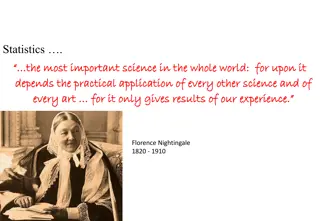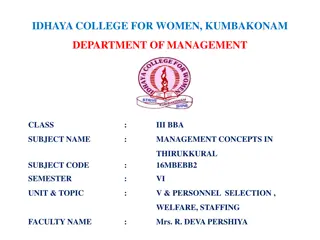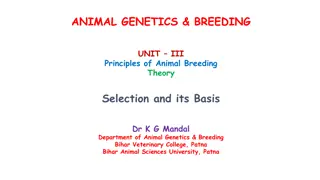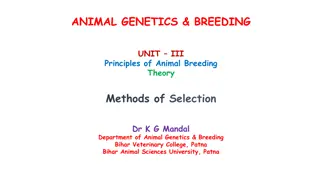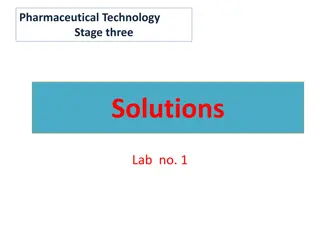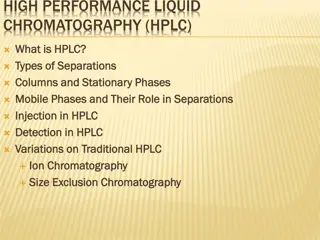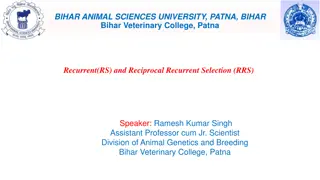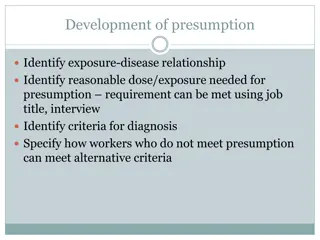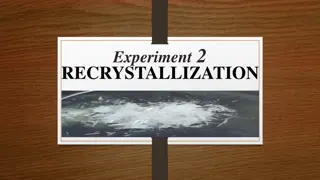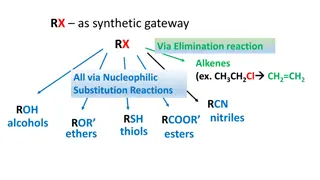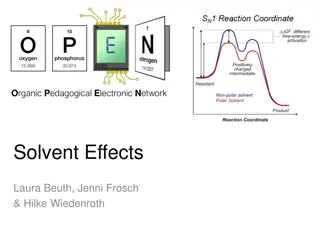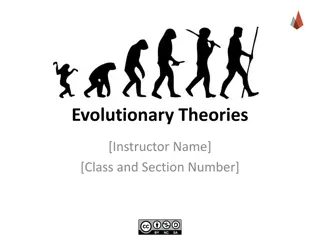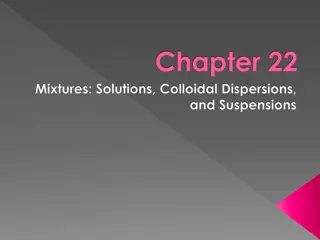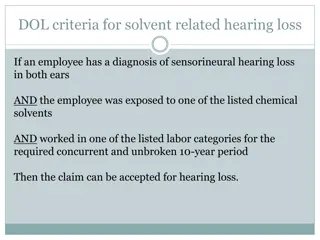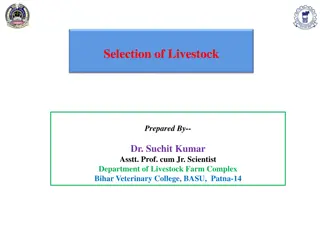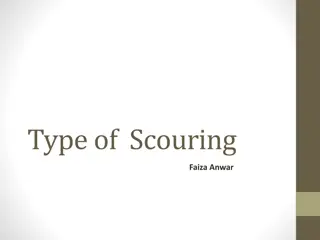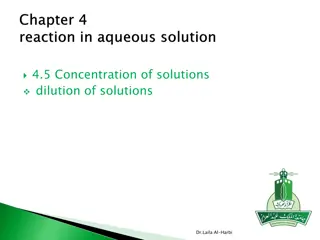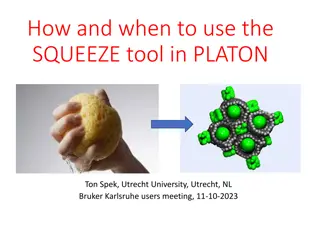INDIAN ARMY AGNIVEER SELECTION PROCESS 2024
https:\/\/youtube.com\/shorts\/3Errhs-10LM?si=gWwlhucXivM1v02s\n\n\n\nIndian Army Agniveer Selection Process 2024\nManasa Defence Academy is proud to offer the best Army training programs, including the NDA Crash Course (6 Months) and NDA Advance Course (1 Year). In this blog post, we will explore t
3 views • 1 slides
Understanding the Recruitment and Selection Process
Recruitment is the process of attracting and obtaining applications from potential candidates, while selection involves choosing the right individuals for job positions. It aims to fulfill both present and future workforce requirements, increase the candidate pool, enhance selection success rates, a
0 views • 22 slides
Section 5.6 — Intermolecular Forces & Properties
Water's exceptional properties, including polarity and hydrogen bonding, make it essential for life and an excellent solvent. The intermolecular forces in water allow it to function as a vital molecule with distinct characteristics that enable it to interact with other substances like soap. By lever
0 views • 23 slides
Developing Captains Councils - Challenges, Successes, and Selection Process
Explore the challenges faced in developing captains councils such as schedule consistency and captain selection process. Discover the successes in building rapport with students, conducting honest conversations, and implementing training programs. Learn about the captains selection process including
0 views • 13 slides
MyBlueprint 2024-2025 Course Selection
Explore the essential steps for course selection in the academic year 2024-2025 at Loyola C.S.S. Learn about important dates, log-on activation key, online learning requirements, alternate courses, parental approval, and submission processes. Discover how to make changes post-submission through your
2 views • 20 slides
Understanding Logistic Regression Model Selection in Statistics
Statistics, as Florence Nightingale famously said, is the most important science in the world. In this chapter on logistic regression, we delve into model selection, interpretation of parameters, and methods such as forward selection, backward elimination, and stepwise selection. Guidelines for sele
4 views • 33 slides
Staff Selection Commission
Staff Selection Commission (SSC)\n\nThe Staff Selection Commission (SSC) is a government organization in India that is responsible for selecting candidates for a wide range of positions across different ministries, departments, and subordinate offices of the Indian government.\nFor the first time in
0 views • 5 slides
Understanding Solutions and Precipitation Reactions
Solutions are classified as saturated, unsaturated, or supersaturated based on the concentration of solute in the solvent. Solubility plays a critical role in determining the amount of solute that can be dissolved in a solvent at a given temperature. Reactions yielding products of limited solubility
6 views • 10 slides
Management Concepts in Personnel Selection and Welfare at Idhaya College for Women, Kumbakonam
The Department of Management at Idhaya College for Women in Kumbakonam offers insights into the importance of personnel selection in organizations. The process of personnel selection involves hiring individuals with the required qualifications to fill vacant positions. Proper selection and placement
0 views • 20 slides
Polymeric Controlled Drug Delivery Systems
Polymeric controlled drug delivery systems play a crucial role in regulating drug release through diffusion, solvent penetration, and chemical mechanisms. These systems include diffusion-controlled, solvent-controlled, and chemically-controlled devices, each operating based on specific principles. S
0 views • 33 slides
Recrystallization for Solid Organic Compound Purification
Recrystallization is a laboratory technique used to purify solids based on their different solubilities. It involves dissolving an impure solid in a suitable solvent, cooling the solution to allow pure crystals to form, filtering to isolate the purified solid, and drying it. Finding a good recrystal
1 views • 11 slides
Principles of Animal Breeding: Selection and its Basis
Selection in animal breeding involves choosing the best individuals to improve specific traits. Criteria for selection include individual merit, competitive exams, and interviews. Selection of farm animals focuses on non-random reproduction of genotypes. Types of selection include natural and artifi
1 views • 40 slides
Principles of Animal Breeding Theory and Methods of Selection
Animal breeding involves selecting for desirable traits to improve the overall merit of animals. Methods such as tandem selection and multi-trait selection are used to enhance genetic progress. Economic value, genetic significance, and selection criteria play important roles in the breeding process.
1 views • 16 slides
Understanding Pharmaceutical Solutions: Types, Classifications, and Preparation Procedures
Exploring the world of pharmaceutical solutions, this content covers the different types of solutions, classifications based on preparation methods, and dosage forms. It discusses the importance of standard solutions and provides insights into the general procedures for preparing simple solutions. A
2 views • 17 slides
An Overview of High Performance Liquid Chromatography (HPLC)
High Performance Liquid Chromatography (HPLC) is a powerful analytical technique used for separating and identifying compounds in a mixture. It involves a mobile phase and a stationary phase to achieve separation based on different physicochemical properties. The mobile phase plays a crucial role in
0 views • 20 slides
Recruitment and Selection Process in Human Resource Management
Recruitment and selection are vital processes in human resource management. Recruitment involves attracting candidates for job positions within an organization through various sources, both internal and external. The steps in recruitment include planning, strategy development, searching, screening,
0 views • 6 slides
Understanding Selection Strategies in Animal Genetics and Breeding
Genes influence traits through Additive Gene Action (AGA) and Non-Additive Gene Action (NAGA) in animal breeding. Recurrent Selection (RS) and Reciprocal Recurrent Selection (RRS) play crucial roles in improving animals. Selection for General Combining Ability (GCA) and Specific Combining Ability (S
0 views • 16 slides
Selection Board Training and Human Resources Responsibilities in Hawaii National Guard
This document outlines the agenda for the Selection Board Training conducted by the Hawaii National Guard Human Resources Office. It covers recruitment, selection processes, decision-making, and job offer responsibilities. References to relevant U.S. Codes and Acts are provided. The structure of the
0 views • 48 slides
HelmholtzCloud Service Selection Process Overview
The Helmholtz Cloud Service Selection Process is detailed through service surveys, iterations, criteria types, and exclusion processes. Service providers deliver data, weighting and selection criteria are applied, and candidate services are listed based on surveys and integrations. Criteria categori
0 views • 41 slides
Development of Presumption Criteria for Solvent-Induced Hearing Loss
Development of a presumption criteria by the Department of Labor (DOL) for identifying the exposure-disease relationship in cases of solvent-induced hearing loss. The DOL requires a diagnosis of sensorineural hearing loss in both ears, exposure to specific solvents, and a history of working in desig
0 views • 7 slides
Enhancing Internet Telephony Quality Through Predictive Relay Selection
Examining the quality of Internet telephony in relation to network performance, this research explores the use of Managed Overlay to improve call quality for services like Skype. Analysis of 430 million Skype calls reveals that a significant portion experience poor network performance, emphasizing t
1 views • 26 slides
Guide to Recrystallization Techniques for Purifying Solid Organic Compounds
Solid organic compounds obtained from organic reactions are often impure and require purification through recrystallization. This process involves choosing a suitable solvent, testing solubility, and using decolorizing charcoal to remove impurities. Proper solvent selection is crucial for successful
0 views • 13 slides
Nucleophilic Substitution Reactions: Factors Affecting SN2 Reactivity
Understanding the factors influencing SN2 reactions in synthetic gateways involving elimination reactions of alkenes is crucial for predicting reaction rates. This includes analyzing the impact of solvent types on reaction rates in different scenarios. Polar protic solvents and polar aprotic solvent
0 views • 19 slides
Understanding Solvent Effects in Organic Chemistry
Different solvents can have varying effects on chemical reactions by influencing solubility, stability, and reaction rates. Solvents can control the pathway towards forming either thermodynamic or kinetic products based on their selection. Solutes dissolve based on intermolecular interactions with s
0 views • 6 slides
Understanding Evolutionary Theories and Strategies
Exploring evolutionary theories such as Sexual Selection Theory and Gene Selection Theory sheds light on how characteristics evolve for mating advantage. Insights into intersexual and intrasexual competition offer a deeper understanding of mate selection preferences. Gene selection mechanisms influe
0 views • 20 slides
Understanding Natural Selection and Its Mechanisms
Explore the concepts of natural selection, survival of the fittest, and various types of selection processes in evolutionary biology. From the struggle for existence to sexual selection, learn how organisms adapt to their environment through genetic contributions and mating strategies. Discover exam
0 views • 8 slides
Understanding Solution Concentration in Chemistry
Solutions in chemistry are homogeneous mixtures of two or more substances where each maintains its own chemical identity. They consist of a solute, the substance being dissolved, and a solvent, the substance used to dissolve the solute. Solution concentration can be described qualitatively as concen
0 views • 17 slides
Understanding Mixtures: Solutions, Colloidal Dispersions, and Suspensions
Food mixtures can be classified based on particle size distribution, with the dispersed phase scattered throughout a continuous medium. Solutions, a type of mixture, consist of a solute (dispersed phase) and a solvent (continuous phase), forming a homogenous blend. Factors like temperature, particle
0 views • 80 slides
Understanding Freezing Point Depression and Molality for Solutions
Introduction to molality and freezing point depression in solutions. Molality is a way to measure solution concentration, calculated using moles of solute and kilograms of solvent. By calculating the moles of NaCl in a salt solution and the mass of the solvent (ice/water), the molality can be determ
0 views • 9 slides
Role of Solvent in Spectral Properties and Solvatochromism
Solvent plays a crucial role in physical and chemical processes, affecting kinetics, equilibria, and spectral properties such as UV-vis, IR, and NMR. Solvathochromism describes the change in spectral bands caused by solvent interactions. Factors like solvent polarity and hydrogen bonding influence d
0 views • 19 slides
Student of the Year Guidelines and Selection Process Overview
Explore the revised 2020 Student of the Year guidelines, understand the selection process for Grades 5, 8, and 12, learn about scoring form revisions, LEA roles, components, paperwork submission, and more. Get insights on starting the selection process and completing necessary forms. Discover how in
0 views • 23 slides
Criteria for Solvent-Related Hearing Loss and Compensation Claims
The Department of Labor (DOL) has specific criteria for accepting claims related to solvent-induced hearing loss in employees. If an employee has sensorineural hearing loss in both ears, was exposed to certain chemical solvents, and worked in particular job categories for a concurrent 10-year period
0 views • 8 slides
Brigade Commander and Staff Selection Process Decision Briefing
In the decision briefing for the selection process of APS JROTC Brigade Commander and Staff, the purpose is to determine the best process that meets the needs, constraints, and preferences. The plan is to implement a standardized nomination and evaluation process in the selection of Brigade Commande
0 views • 18 slides
Understanding Selection Methods in Livestock Breeding
Livestock breeding involves various methods of selection such as individual selection, pedigree selection, progeny selection, and more. These methods aim to improve desirable traits in animals through controlled breeding programs. Selection criteria include performance, genetic lineage, and specific
0 views • 27 slides
Recent Advances in FEVE Fluoropolymer Resin Technology
Recent discoveries in FEVE technology showcase the impressive properties of Fluoroethylene Vinyl Ether (FEVE) resins, such as weatherability, chemical resistance, gloss, solubility, and crosslinking. These resins offer ambient cure for field applications, OH functionality for crosslinking, solvent s
0 views • 25 slides
Different Methods of Textile Scouring Explained
Wool scouring and solvent scouring are two essential processes in textile production. Wool scouring involves removing wool grease before spinning yarn, while solvent scouring uses solvents to clean fabrics like polyester and nylon. Solvent scouring offers benefits like simultaneous desizing and blea
0 views • 15 slides
Understanding Concentration and Dilution of Solutions by Dr. Laila Al-Harbi
Dr. Laila Al-Harbi explains the concept of concentration of solutions, focusing on molarity and the calculation involved. The molar concentration of solutions is determined by the amount of solute in a given volume of solvent, expressed as moles of solute per liter of solution. Additionally, the pro
0 views • 15 slides
Vigil Nomination and Selection Process Overview
The Vigil Nomination and Selection Process involves processes at both the chapter and lodge levels, including the appointment of chairman and adviser, duties of the nominating committee, eligibility criteria, survey letters, nominee selection, completing nomination forms, and deadlines for submissio
0 views • 30 slides
Challenges in Staff Selection for Equality and Diversity in Academic Institutions
Despite some progress, challenges persist in the selection of staff in academic institutions, particularly concerning under-selection of minority ethnic staff and those with disabilities. The report highlights disparities in selection rates based on gender, age, nationality, and ethnicity. Addressin
0 views • 27 slides
Understanding the SQUEEZE Tool in PLATON for Solvent Refinement
The SQUEEZE tool in PLATON, developed by Utrecht University, offers an effective method for handling disordered solvent refinement in crystallography. This tool, part of the SHELXL suite, aids in modeling and refining solvent parameters when traditional methods may not suffice. Learn about its histo
0 views • 23 slides





